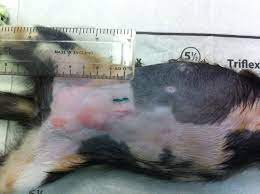Are Shar-Pei Dogs Aggressive?
Shar-Pei dogs are known for their distinctive appearance and wrinkles, which make them instantly recognizable. Shar-Pei dogs have garnered significant attention and raised concerns due to misconceptions surrounding their potential for aggression. This comprehensive article aims to delve into the temperament of Shar-Pei dogs, debunk prevalent misunderstandings, analyze the influencing factors behind aggression, explore observable signs of aggression, and offer valuable guidance on effectively managing and preventing aggression in these remarkable canines.
Introduction
Hailing from China, Shar-Pei dogs emerge as medium-sized canines intertwined with a rich heritage encompassing the realms of guarding, hunting, and herding. They showcase remarkable physical attributes, notably loose skin, and wrinkles, endowing them with an unmistakable visage. To gain profound insights into the aggression aspect of Shar-Pei dogs, it becomes imperative to embark on an exploration of aggression in canines at large while immersing ourselves in the intricate tapestry of their unique temperament.
Understanding Aggression in Dogs
Aggression in dogs is a complex behavior that can manifest in various forms, including growling, barking, biting, or lunging. It is important to note that aggression is not a breed-specific trait but rather a result of several factors, including genetics, environment, training, and socialization.
The Temperament of Shar-Pei Dogs
When assessing the temperament of Shar-Pei dogs, it becomes paramount to consider both their general temperamental attributes and the distinct characteristics that set them apart. While individual dogs may display diverse personalities, Shar-Pei dogs are often characterized as independent, loyal, and protective.
Misconceptions about Shar-Pei Aggression
Various misconceptions abound concerning Shar-Pei’s aggression. A common fallacy revolves around the belief that all Shar-Pei dogs possess inherent aggression. However, such a notion oversimplifies the matter and disregards the impact of genetics, training, and socialization.
Factors Influencing Aggression in Shar-Pei Dogs
Genetics play a pivotal role in shaping a dog’s disposition and propensity for aggression, including Shar-Pei dogs. Like any other breed, Shar-Pei dogs may exhibit a genetic predisposition toward specific behaviors. Nonetheless, it is vital to emphasize that genetics alone do not dictate a dog’s behavior, and responsible breeding practices can help alleviate potential concerns.
Socialization and training also play crucial roles in shaping a dog’s behavior. Early socialization, exposing Shar-Pei puppies to various people, animals, and environments, can help them develop appropriate social skills and reduce the likelihood of aggressive tendencies. Additionally, positive reinforcement-based training methods can help teach Shar-Pei dogs desirable behaviors and establish clear boundaries.
Signs of Aggression in Shar-Pei Dogs
Being able to identify the indicators of aggression in Shar-Pei dogs holds paramount importance for proactive handling. Typical behavioral cues that might signify aggression encompass growling, snarling, baring teeth, sudden lunging, and biting. Vigilance towards your Shar-Pei dog’s body language and vigilant observation of any shifts in behavior that hint at aggression is crucial. These signals should never be disregarded and must prompt you to undertake suitable measures.
See also: How Dangerous Are Shar Pei Dogs
Managing and Preventing Aggression in Shar-Pei Dogs
Managing and preventing aggression in Shar-Pei dogs requires a proactive approach. Here are some strategies to consider:
- Socialization techniques: Introduce your Shar-Pei puppy to various environments, people, and animals from an early age. This exposure helps them develop positive associations and reduces the likelihood of fear-based aggression.
- Training methods: Utilize positive reinforcement techniques to train your Shar-Pei dog. Rewarding desired behaviors encourages them to repeat those actions, reinforcing good behavior and reducing the likelihood of aggressive tendencies.
- Seeking professional help: If you notice signs of aggression in your Shar-Pei dog or are unsure how to manage their behavior effectively, consult a professional dog trainer or behaviorist. They can provide guidance tailored to your specific situation and help address any underlying issues.
- Provide a safe and secure environment: Ensure your Shar-Pei dog has a safe and secure living environment. This includes a properly fenced yard, secure gates, and supervision when interacting with unfamiliar people or animals.
- Meeting the dog’s physical and mental needs: A well-exercised and mentally stimulated Shar-Pei dog is less likely to exhibit aggressive behaviors. Provide regular exercise, playtime, and mental stimulation through interactive toys and training sessions.
The Importance of Responsible Ownership
Responsible ownership plays a crucial role in preventing aggression in Shar-Pei dogs and ensuring their overall well-being. Here are some important aspects to consider:
- Proper socialization: Expose your Shar-Pei dog to different experiences, people, and animals, gradually and positively, from an early age. This helps them become well-rounded and confident, reducing the chances of fear-based aggression.
- Positive reinforcement training: Use positive reinforcement techniques, such as treats, praise, and rewards, to reinforce desired behaviors. Avoid harsh punishment, as it can lead to fear or aggression.
- Consistency and structure: Establish consistent rules and boundaries for your Shar-Pei dog. This helps them understand their place in the family hierarchy and promotes a sense of security.
- Healthcare and regular check-ups: Ensure your Shar-Pei dog receives regular veterinary care, including vaccinations, check-ups, and preventive measures against parasites. Address any health issues promptly, as pain or discomfort can contribute to aggression.
- Supervision and responsible interactions: Always supervise interactions between your Shar-Pei dog, children, or unfamiliar people. Educate others on appropriate ways to interact with your dog and recognize signs of discomfort or aggression.
See also: Are Shar Pie Dogs Friendly
Conclusion
Contrary to prevailing misconceptions, it is crucial to emphasize that Shar-Pei dogs do not possess an inherent inclination toward aggression. Like all canine breeds, their disposition is shaped by a diverse array of factors, including genetic makeup, socialization experiences, and training methods. By gaining a comprehensive understanding of the distinctive characteristics exhibited by Shar-Pei dogs, dispelling unfounded notions, and implementing suitable approaches to management and training, aggression can be effectively mitigated and addressed. Responsible ownership, encompassing the facilitation of positive social interactions, the utilization of reinforcement-based training techniques, and the provision of a secure and nurturing environment, assumes a paramount role in fostering the polite and contented demeanor of Shar-Pei dogs.
FAQs (Frequently Asked Questions)
Q: Can all Shar-Pei dogs become aggressive?
A: No, not all Shar-Pei dogs become aggressive. Aggression is influenced by various factors, and responsible breeding, socialization, and training can significantly reduce the likelihood of aggression.
Q: Are Shar-Pei dogs good with children?
A: Shar-Pei dogs can be good family pets with proper socialization and training. However, supervision is important when they interact with children to ensure everyone’s safety.
Q: Are Shar-Pei dogs suitable for first-time dog owners?
A: Shar-Pei dogs can be a challenging breed for first-time dog owners due to their independent nature. They require consistent training, socialization, and a firm yet gentle approach. Experienced owners or those willing to invest time and effort in their dog’s upbringing may find success with this breed.
Q: Can aggression in Shar-Pei dogs be eliminated?
A: Although it is possible to manage and decrease aggression in Shar-Pei dogs through appropriate training and socialization, it is crucial to recognize that every dog is unique. Some dogs may have a greater inclination towards certain behaviors, and it is not possible to guarantee the complete eradication of aggression. However, with responsible ownership, consistent training, and early intervention, it is often possible to mitigate and control aggressive tendencies in Shar-Pei dogs, promoting a safer and more harmonious environment for both the dog and its owners. Regular monitoring, ongoing training, and seeking professional help, when necessary, can contribute to a better understanding and management of aggression in Shar-Pei dogs.
See also: Are Chinese Shar-Pei Aggressive?
Q: Are there specific training methods recommended for Shar-Pei dogs?
A: Positive reinforcement training methods, such as clicker training and reward-based techniques, are commonly recommended for Shar-Pei dogs. These approaches create a positive learning environment and strengthen the bond between the dog and the owner. By using rewards, such as treats, praise, or play, to reinforce desired behaviors, Shar-Pei dogs can learn and respond effectively. It is important to be consistent, patient, and gentle during the training process, focusing on rewarding good behavior rather than punishing unwanted behavior. This approach encourages a cooperative and trusting relationship with your Shar-Pei dog while fostering their confidence and willingness to learn.
Q: Can aggression in Shar-Pei dogs be a result of mistreatment?
A: Mistreatment or abuse can contribute to aggression in any dog breed, including Shar-Pei dogs. It is crucial to provide a loving and nurturing environment for your dog, avoiding harsh punishment and opting for positive reinforcement training methods. If your Shar-Pei dog exhibits signs of aggression that may be related to past trauma or mistreatment, it is advisable to seek professional help from a qualified dog trainer or behaviorist. They can assess the situation, provide guidance, and develop a customized behavior modification plan to address the underlying issues and promote positive change. Remember, patience, understanding, and compassion are key when helping a dog overcome aggression resulting from past mistreatment.
Remember, understanding and addressing aggression in Shar-Pei dogs requires patience, consistency, and responsible ownership. By providing a balanced approach to training, socialization, and healthcare, you can help your Shar-Pei dog thrive in a loving and harmonious environment.




